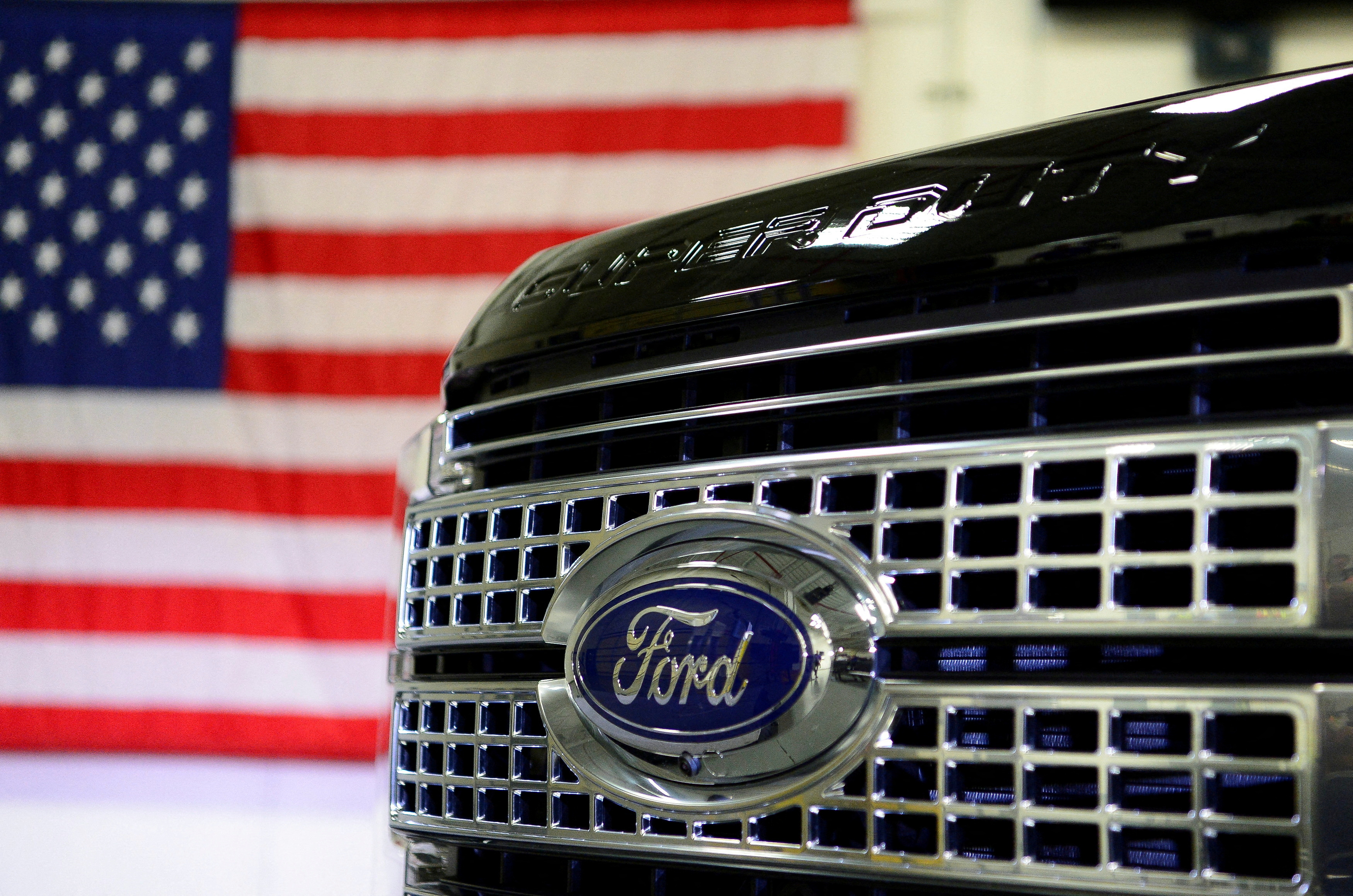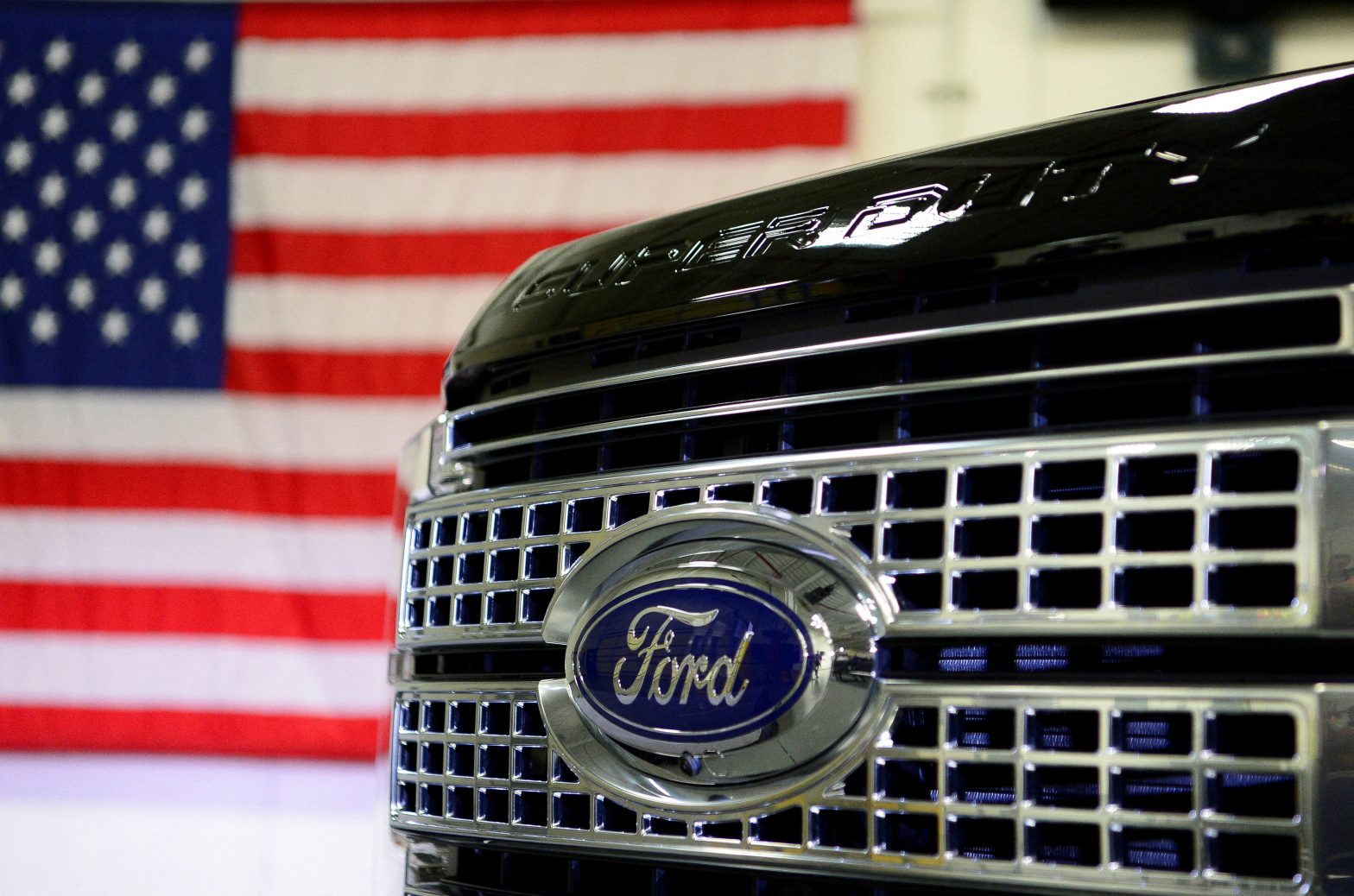
A newly remodeled Ford F250 Super Duty truck is displayed at the new Louisville Ford truck plant in Louisville, Kentucky, U.S. September 30, 2016. REUTERS/Bryan Woolston/File Photo Acquire Licensing Rights
DETROIT, Oct 12 (Reuters) – U.S. auto workers are expected to return to talks with Chrysler maker Stellantis on Thursday, a tense day after a surprise walkout at Ford’s biggest and most profitable plant sharply raised the stakes between the United Auto Workers and the Detroit Three.
The Wednesday evening decision to shut Ford’s (F.N) Kentucky truck plant employing 8,700 workers, the largest single walkout since targeted strikes began four weeks ago, came as the UAW and Stellantis (STLAM.MI) prepared for another major round of bargaining, sources said.
Ford’s shares fell 2.2% to $11.98 in premarket trade while GM’s shares were marginally lower by 0.1% at $30.95.
Nearly a quarter of the 150,000 UAW workers at the Detroit Three automakers are now on strike, and thousands more have been furloughed from jobs at operations that are not on strike because automakers said the walkouts made their work unnecessary.
The Kentucky walkout is a warning to Stellantis and General Motors (GM.N), whose wage and benefits offers fall short of Ford’s, based on summaries the automakers and the UAW have released.
“This puts everybody on notice,” said Sam Fiorani, vice president of global vehicle forecasting at AutoForecast Solutions. “If they haven’t brought anything new to the table since last week, GM and Stellantis should be worried.”
Automakers have more than doubled initial wage hike offers, agreed to raise wages along with inflation and improved pay for temporary workers, but the union wants higher wages still, the abolishment of a two-tier wage system and the expansion of unions to battery plants.
UAW President Shawn Fain’s decision to shut down assembly lines that build Ford Super Duty pickup trucks and Lincoln Navigator and Ford Expedition large SUVs is a blow to Ford that could quickly undermine the automaker’s full-year profits.
Ford’s Kentucky truck plant, its most profitable operation, generates $25 billion in annual sales, about a sixth of the company’s global automotive revenue.
“There are very expensive products here that are extremely profitable,” Fiorani said. “With the Super Duty in this plant, this is Ford’s largest plant. They’re on target to build 400,000 vehicles this year.”
Fain and other UAW officials called a meeting with Ford at 5:30 pm ET (21:30 GMT) on Wednesday and demanded a new offer, which Ford did not have, a Ford official said.
“You just lost Kentucky Truck,” Fain said, according to the Ford official and a union source, speaking on condition of anonymity because the talks are not public.
“This is all you have for us? Our members’ lives and my handshake are worth more than this,” Fain added, according to the union source.
Ford said the decision was “grossly irresponsible but unsurprising given the union leadership’s stated strategy of keeping the Detroit 3 wounded for months through ‘reputational damage’ and ‘industrial chaos.'”
The Kentucky plant “is a very profitable plant and because there was no notice at all, it will be particularly disruptive,” said Harley Shaiken, a labor professor at the University of California, Berkeley. “This is a major step hitting the bottom line.”
Fain has said his aim is to keep the automakers off balance by taking targeted action rather than a full strike at all operations.
“We’re not gonna wait around forever,” he said on social media platform X on Wednesday evening. “If Ford can’t get that after four weeks on strike, these 8,700 workers shutting down their biggest plant will help them understand it.”
Last Friday, he said if needed, the UAW would strike the GM assembly plant in Arlington, Texas that builds Cadillac Escalade, Chevy Suburban and other large, high-priced SUVs.
High-profit targets at Stellantis include the automaker’s Ram pickup truck factories in Sterling Heights and Warren, Michigan, as well as two Jeep SUV factories in Detroit.
The Detroit automakers will report third-quarter financial results between Oct. 24 and 31, and the UAW could use what are expected to be robust profits to press their case for a richer contract.
Before Wednesday’s Ford announcement, the union had ordered walkouts at five assembly plants, including two Ford assembly plants, at the three companies and 38 parts depots operated by GM and Stellantis.
Reporting by Joe White in Detroit, Abhirup Roy in San Francisco and David Shepardson in Washington; Editing by Peter Henderson and Jamie Freed
Our Standards: The Thomson Reuters Trust Principles.
